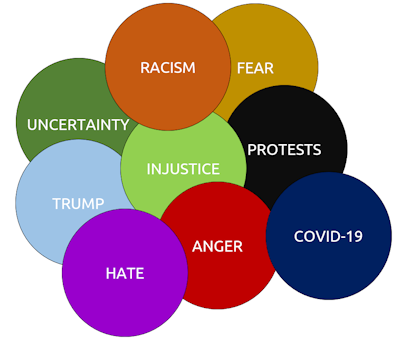What Happens When We Have an Election That Both Sides Absolutely Positively Can't Afford to Lose?
by
August 13, 2020
| This is the first of a series of posts that explore the danger that the United States' hyper-polarized political environment might suddenly erupt into large-scale political violence—and what might be done to limit that danger. Links to the full series plus other escalation-related materials can be found on the Conflict Fundamentals Seminar/Blog page on Escalation. |
Since the start of the Trump Presidency, Heidi Burgess and I have been trying to add our voices to calls for a revitalized, 21st-century democracy. This democracy would build on democracy's past ideals, but would more effectively address the many shortcomings and inequities that are at the core of populist rebellions on both the left and the right. We see this as the only realistic alternative that we have to a dystopian future, one characterized by some awful combination of ruthless autocratic rule, kleptocratic exploitation, the chaotic anarchy of a failed state, and/or a violent struggle for social dominance.
As the Trump Presidency has evolved over the last three years, attention has rightly focused on the degree to which the Administration is moving us ever closer to some type of kleptocratic, authoritarian, failed state. We have, however, thankfully noted that, despite this terrifying trend, social taboos against violent political confrontations have, so far at least, largely held.
A big part of the reason why things haven't deteriorated further is that people still see the Fall 2020 election as the place where the dispute between the President, his supporters, and his many opponents will be definitively and nonviolently resolved. Unfortunately, there are good reasons to fear that the taboos against violent political confrontation might not last beyond (or even to) the election.
Both sides have come to believe that this is an election that they absolutely, positively, can't afford to lose.
| Both sides have come to believe that this is an election that they absolutely, positively, can't afford to lose, as they see the policies of the other side as truly evil. |
The Right, among many other things, is terrified of being dominated by some extreme form of the Left's progressive, so-called "politically-correct," "anti-Christian," "cancel culture" along with the possibility of having to transfer much of their already precarious economic resources to people and groups that the left champions, but the right sees as undeserving. Beyond that, there is widespread resentment toward what the Right sees as the "overpaid, underperforming, big-city, urban elites."
The Left, for its part, is repelled by the right's embrace of the President's racist rhetoric and hard-line, police-state tactics for responding to the George Floyd-related protests. They are similarly horrified by the way that the Administration has treated would-be immigrants and undocumented US residents (including, for example, the "DREAMers"). The Left is also aghast at the Administration's refusal to treat the COVID-19 pandemic is as anything more than a public relations problem and an opportunity to further inflame the culture wars. Beyond this, they resent the Administration's general demonization of expertise and willingness to systematically undo any and all efforts of the Left to address society's big problems (e.g. climate change, inequality, health care, etc.). And, of course, there is the President's systematic effort to dismantle the democratic norms and institutions (including elections) that protect us from authoritarian rule.
Beyond these concerns of grassroots voters, there are also foreign political rivals (such as Russia, China, Iran, and North Korea) who seem to see themselves as engaged in a new kind of 21st-century hybrid Cold War. Their hacking of government and business databases and websites, and their flooding social media with inflammatory fake posts is greatly escalating the existing hostilities and tensions that threaten the very stability of the United States' culture and government.
In today's highly competitive political environment, both the Left and the Right are likely to realize that effectively protecting their interests is going to require them go "all out" in ways that require the use of pretty much every political power option that they might have at their disposal. This, unfortunately, is likely to increasingly include tactics that leap across taboo lines that previously protected us from our most destructive and illegitimate forms of political combat (such as fixing or discrediting elections).
| Future posts in this series will consider potential triggering events, how to prevent them, and how to start disarming this situation. |








